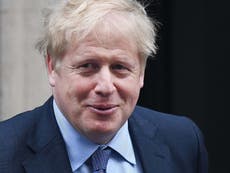Predicting the political year ahead is always a mug’s game – yet we gather every year to do it anyway
Our Peter Mandelson Memorial Dim Sum Supper has finally reconvened, a tradition since 1998

We missed two years, but one of the great institutions of the uncodified British constitution is back. The Peter Mandelson Memorial Dim Sum Supper has finally reconvened and issued its predictions for the political year ahead.
The event began on 23 December 1998, when I was in a Chinese restaurant with a group of friends in Soho and the news came through that Mandelson had resigned from the cabinet. By coincidence, the same group was lunching on 24 January 2001, when Mandelson resigned again.
Since then we have gathered every year, just before or after Christmas, to discuss what we think is going to happen in the coming year. Our proceedings were even followed by David Cameron when he was prime minister, although for him they were a lesson in how easy it is to get politics wrong: we failed to predict the Tories gaining seats from the Lib Dems in the 2015 election, which is what gave Cameron his majority, and which led to the EU referendum.
Having got the 2015 election wrong in our predictions for that year, we got the referendum wrong in our 2016 forecast, assuming that Remain would win. Undaunted, we returned to the fray in our prospectus for 2017.
Personally, I didn’t think we did badly. We saw Emmanuel Macron coming in France (he was elected president in May); we thought Angela Merkel would continue in Germany. Our big flaw was that we assumed the next British election would be this year, by which time we assumed the Jeremy Corbyn phenomenon would have blown itself out. We didn’t realise that it would take two elections to do it.
Our discussion about who might succeed Corbyn was inconclusive, listing Clive Lewis, Lisa Nandy, Keir Starmer and Angela Rayner before settling uncertainly on Sadiq Khan, on the grounds that his first term as mayor of London would end at the time of the 2020 general election.
I would say, as a glass-half-full person, that this was impressive futurology, with three of those names featuring in the current leadership and deputy leadership elections, but some of my fellow forecasters are more critical. Whatever the reason – it may be that they didn’t approve of the excesses of ritual self-flagellation that have marred previous gatherings – we failed to meet to predict what would happen in 2018 and 2019.
Now, however, we are back. It was a French restaurant this time, rather than Chinese, but the essential business, over steak tartare and lemon sole rather than dim sum, was the same.
With the hors d’oeuvres we discussed the US election. This was really just a warm-up exercise. We thought the Democratic candidate would be Bernie Sanders or Joe Biden. This was before the Iowa caucuses, where the results are still not complete but in which Biden came fourth – although that hardly matters because we predicted Donald Trump would be re-elected.
The serious discussion over the main course turned to Boris Johnson’s cabinet reshuffle. All participants were reluctant to commit themselves, which, given that my sources tell me that the prime minister has not made any final decisions yet, is not surprising.
We thought the most interesting question was what would happen to Michael Gove, currently parked in a troubleshooting role at the Cabinet Office. There was general agreement that the best plan would be to create a new green department, taking energy and climate change out of the business department, possibly combining it with the environment, food and rural affairs, and to put Gove in charge of it, along with responsibility for the big UN climate change conference in Glasgow in November.
The climate change conference is likely to be a failure, because neither the US nor China has any interest in its succeeding, but Gove is best placed both to exceed low expectations and to use it to burnish the government’s green credentials. Only he has the green credibility to offset the damage done by the clumsy sacking of Claire O’Neill, the Tory former minister, who had been in charge of the conference.
Our discussions about the new shadow cabinet were more detailed. We all assumed that Starmer and Rayner would win as Labour leader and deputy leader. Contrary to my view a month ago that Starmer would appoint Rachel Reeves or Yvette Cooper as shadow chancellor, the majority view now was that Lisa Nandy is likely to get the all-important post. She is doing well in the leadership campaign, while Rebecca Long-Bailey is doing badly enough to be safely overlooked. Long-Bailey, the author of the Green New Deal, which she still insists on calling the Green Industrial Revolution, could shadow whichever department ends up being responsible for climate change.
For serious Kremlinologists, there is the question of whether Nandy or Rayner would stand in for Starmer at Prime Minister’s Questions; again, the majority favoured Nandy. We thought Emily Thornberry, who stood in for Corbyn until the task was handed to Long-Bailey, would continue as shadow foreign secretary and that Cooper would return as shadow home secretary.
For the rest, we thought the Scottish National Party would win a majority in the Scottish parliament elections next year, but that there would not be a second independence referendum by the time of the next UK general election – which we expected in May 2024. The majority predicted another Conservative majority in that election; a minority went for a hung parliament in which Labour could form a minority government. No one thought the UK would rejoin the EU in our lifetimes.
The most difficult and divisive question was to say when Dominic Cummings, the prime minister’s prime adviser, will leave the government. No one thought he would leave this year, but a range of guesses between 2021 and 2024 meant we had that one covered.
Before we could get on to the testing question of who will succeed Johnson as leader of the Conservative Party, the bill arrived. So you will have to wait until next year’s dim sum supper for the answer to that one.





Join our commenting forum
Join thought-provoking conversations, follow other Independent readers and see their replies